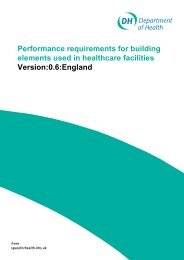Early Life Nutrition and Lifelong Health - Derbyshire Local Medical ...
Early Life Nutrition and Lifelong Health - Derbyshire Local Medical ...
Early Life Nutrition and Lifelong Health - Derbyshire Local Medical ...
Create successful ePaper yourself
Turn your PDF publications into a flip-book with our unique Google optimized e-Paper software.
BMA Board of ScienceInterventions in complementary feedingThere is little evidence relating to interventions that aim to influence the timing <strong>and</strong> nutritionalcontent of complementary feeding in developed country settings. One study of WIC participantssuggested that peer-delivered educational interventions can be effective in reducing inappropriateearly introduction of solid foods. 276 The study was based on 181 adolescent mothers who wereshown a videotape made by a peer-group of black adolescent mothers which challenged thebarriers to following infant feeding guidance. The intervention was delivered as part of a homevisitingprogramme <strong>and</strong> assessed in a RCT. Mothers who were part of the intervention group weresignificantly more likely to introduce their babies to solid foods later <strong>and</strong> were more likely to reportaccurate knowledge of the optimal timing for the introduction of complementary food. A recentRCT set in Germany assessed the effect on infant diet of dietary counselling derived from foodbasedguidelines for infant nutrition. 277 The study found that more intensive telephone counsellingwas more effective than less intensive counselling or written information alone in improvingadherence to infant feeding guidance (assessed by food-based <strong>and</strong> meal-based dietary scores). Theauthors suggested that face-to-face counselling may have even greater positive effects on infantfeeding practices. In developing countries where tackling infant undernutrition is the primary focusof intervention, there is evidence that educational interventions, combined with food support incountries that are food insecure are effective in improving infant nutrient intake <strong>and</strong> growth. 123Mechanisms to address nutritional inequalities in the UKInequalities in the nutrition of young women <strong>and</strong> their children in the UK (see Box 13) can havelong-term health consequences. Although evidence of successful interventions to address theseinequalities may be limited, we already have a sufficiently clear underst<strong>and</strong>ing of the effects ofearly disadvantage to make the nutritional needs of mothers <strong>and</strong> their children a priority.Box 13: Inequalities in maternal <strong>and</strong> infant nutrition• Women of lower educational attainment are more likely to have diets of poor quality thanother women. 139• Consumption of fruit <strong>and</strong> vegetables is lower in low income groups in the UK whileconsumption of soft drinks, processed meats, whole milk <strong>and</strong> sugar is higher. 254• Many people with low incomes in the UK are food insecure, <strong>and</strong> food insecurity in womenis associated with poorer diets. 254• Breastfeeding rates are lower in mothers from disadvantaged backgrounds. 131• <strong>Early</strong> introduction of solids is more common in young mothers <strong>and</strong> mothers of lowersocio-economic status. 131• Compliance with infant feeding guidance to provide a diet based on fruits, vegetables <strong>and</strong>home-prepared foods is strongly associated with the quality of the mother’s own diet. 138<strong>Early</strong> life nutrition <strong>and</strong> lifelong health 61



